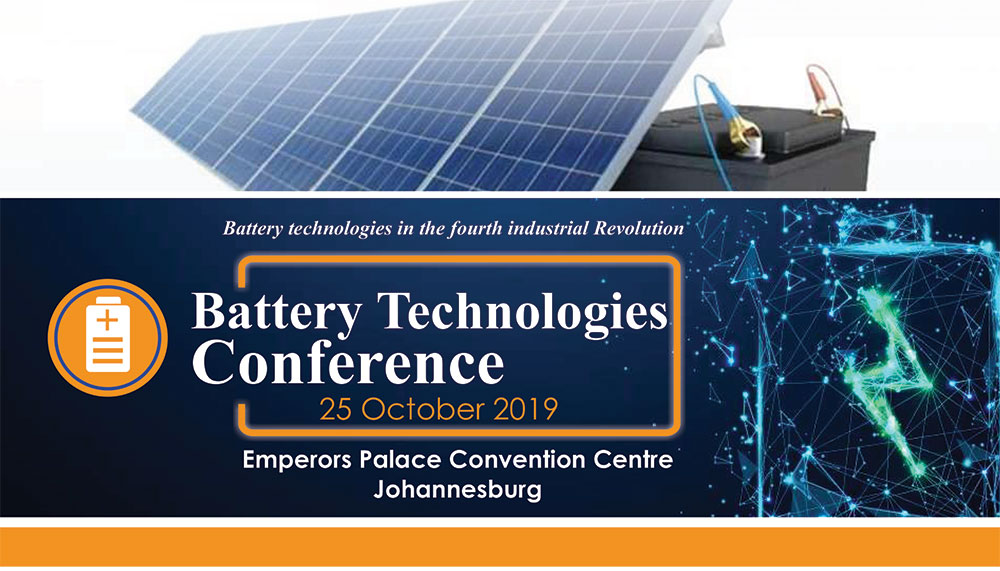
Sep
Battery Technologies Conference
Batteries are a critical enabler of the Fourth Industrial Revolution, powering technology in products from laptops and hand-held devices to electric vehicles and renewable energy storage. However, with more batteries placed on the market, the need for solutions when they reach their end of life is rising. The increasing demand for batteries is also revealing and amplifying a wide spectrum of risks associated with the materials that make up the batteries themselves. The risks present significant reputational, legal, compliance and commercial concerns for major industries while simultaneously responding to external pressure concerning their products. Some promising solutions to address these issues are already underway although there are still gaps that require to be filled through increased interactions and accelerated cooperation towards common transformational goals. A primary reason for this is that the battery value chain is a complex system that comprises participants from various industries and sectors. Similarly, although lithium-ion batteries for instance are not toxic in the same way as lead-acid or nickel cadmium batteries, they do contain elements that should be prevented from being exposed to the environment. Equally important is the potential to recover the materials in waste batteries for the reuse in new batteries. With the unprecedented growth in the market, the demand for raw materials has increased significantly and recycled materials can be a positive contribution from both an environmental and an economical perspective.
It is against this background that this conference has been organised. The conference aims to address developments impacting batteries and power management in portable devices including smart phones, laptops/tablets, medical devices, wearable, military and the various industrial applications. Conference topics will include new battery designs, research and industry developments, improving power management, predicting battery life, regulations and standards, safety and transportation, battery authentication, charging technology, emerging chemistries and market trends. Come and network with battery manufacturers, charger manufacturers, IC companies, materials and manufacturing equipment providers, testing services & systems providers, as well as an array of component and sub-system providers. This conference is geared towards the provision of most up-to-date developments and technologies in the portable, mobile, consumer battery and power management market. If you are involved in the battery industry or if your products and systems run on batteries, this is a must attend event.

Sep
Cashless Payments Summit 2019
We are back with our 4th Annual Cashless Payments Summit to be held on the 7th and 8th of November 2019 at Emperors Palace Convention Centre in Johannesburg, South Africa. The Summit will be running under the theme, ‘Cashless Payments in the disruptive era’.
Slow progress towards cashless economies may be a source of frustration for policymakers, merchants, and financial institutions, all of which stand to accrue benefits from going digital. The right strategies, incentives, infrastructure, and regulation can encourage innovation and boost public confidence in non-cash systems. Partnerships, both public and private, are very critical in marshalling expertise and creating momentum.
Also, for a digital-payments system to take root, support in the form of legal frameworks, electrical networks, and security is very necessary yet African governments and many companies and organisations, lag behind in taking actions that ensure seamless transactions, economic growth, societal development and even innovations with regards to handling and transacting in cash itself.
There is no doubt that the move to cashless payments has brought in a lot of positive outcomes. Cashless and cardless systems are said to have become much safer as they eliminate the risk of cash in transit heists, credit card cloning, and even card skimming. Moreover, the availability of digital systems, has added an extra layer of security to these cashless transactions.
The 2019 Cashless Payments Summit, will discuss among other topics, issues surrounding cashless payments and loyalty programs, digital wallets, payment apps, advancements in technology, showcase solutions for monitoring digital ecosystems, provide ways of propagating digital inclusion, look at the advent of social media networks into the digital payments space, and share best practices in digital transformation with the customer at the centre.
The Summit will deliver on the various ways that may be used to help businesses create cashless payment solutions which are secure and robust, that enhance digital transformations while providing superior customer service. This is a must attend summit for all those interested in cashless and online payment systems. Don’t miss out!

Aug
Cybercrime and Insurance Conference
We are back with our 5th Annual Cybercrime and Insurance Conference to be held on 17 September 2019 at Emperors Palace Convention Centre. With the 4th Industrial Revolution and the increased use of artificial intelligence the cyber security challenge continues to grow. The digitalisation of industries in the build-up to the fourth industrial revolution is a minefield of opportunities and risks. It is in how various industries, and more specifically the insurance industry is dealing with the cybercrime. Collective effort is therefore required in the different industries to increase cybercrime awareness. The industry needs to join forces to combat cyber risk and cybercrime in an increasingly digital world.
Cybercrime and fraud are still major concerns within the short-term insurance sector. This makes data sharing between insurance companies, brokers, and relevant stakeholders mandatory to curb and manage cyber risk and allay consumer fears. Cybersecurity challenges continue to grow, and financial institutions– especially those in the midst of digital transformation efforts – are being highly targeted by cybercriminals. At the same time, they are suffering the same challenges of other organisations, including figuring out how to inspect and secure the growing volume of encrypted traffic, battling the persistence of botnets, and addressing new malware trends such as cryptojacking.
Combating syndicates needs partnerships with insurance companies. Data collection for insurance incidents is more difficult than data collection for life insurance. As industries firmly collaborate and intentionally share information, everyone is at risk with data and connectivity forming the cornerstones of this type of risk. Policies can be developed and redeveloped to cover both individuals and businesses from cyber risk. A policy that ring-fences the specific risks around cyber is therefore required. The country therefore requires clear policy statements on cybercrime, signalling intent in dealing with it and being clear on how the country will respond to suspected network intrusions.
To successfully address today’s challenges, the security teams of insurance organisations need to rethink their strategy, from automating their security hygiene measures to replacing isolated security devices with an integrated security fabric architecture that can seamlessly span the growing attack surface. Call for greater collaboration and information sharing within the industry is therefore of paramount importance if the digital space is to be optimally utilised.
This conference aims to bring together players in the industry to deliberate on ways in which organisations can be prepared for these security breaches. Calls for partnerships and collaboration, education in this sphere are also going to be on discussion at the conference.

Jul
Mining Technology & Security Conference
THE mining industry worldwide is undergoing unprecedented changes, including high commodity prices and rising exploration costs. In South Africa, the GDP from the mining sector decreased to 220907.55 ZAR Million in the first quarter of 2019 from 227291.33 ZAR Million in the fourth quarter of 2018. The fluctuations are partly as a result of number of challenges among others, illegal mining activities, the theft of commodities in refinery or final product stages as well as the hi-jacking of products in-transit. In many instances the loss of commodities is higher than the implementation of new technologies that can be used to manage and to improve security.
Various mines have lost their assets due to cable theft, mineral theft and other crimes within the mining industry. There is need for adaptation of improved technology that enhance security within the mines. The use of data in the mining sector has become imperative in a fast-paced and competitive market, and innovative data management platforms are creating better ways to manage, store and make sense of mining data. Artificial Intelligence (AI) and machine learning applications are being used to analyses important data and pick up patterns, which allows for better planning and resource management.
This conference presents perspectives on mining technologies that are being developed to better understand how mining industries are evolving to improve operational effectiveness and security. South Africa’s mining industry is set to undergo significant transformation in the next decade. With the rise of artificial intelligence, technology is set to drive a lot of what people are currently seeing in the mining industry going forward. The mining industry has to adjust and embrace new technology and innovation, as well as new ways of working. The development of new technologies benefits every aspect of the mineral industry. This includes; exploration, mineral processing, beneficiation, health and safety, as well as environmental issues. Above all, adaptation of technology will boost security within the mines. Technology development therefore, needs to be focused on those areas that are critical to the entire value chain.
This is a must attend conference to those interested in the discussion surrounding mining technology, security and the use of artificial intelligence in mining operations. Topics to be discussed include, technologies in mining, future of intelligent mining, use of drones in mining security, technology funding, challenges being experienced in securing precious resources amongst other topics.


Jul
Pipes XII Conference
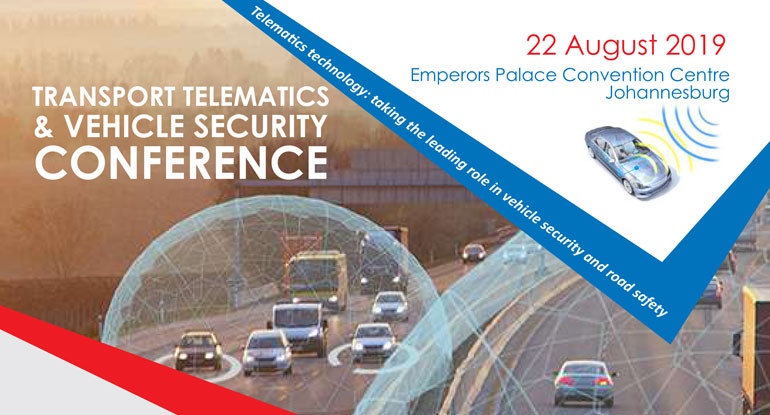
May
We are back again with the 5th Annual Transport Telematics & Vehicle Security Conference to be held on 22 August 2019. This year’s edition promises to bring under one roof experts in the transport telematics to discuss how best telematics innovations are can be developed and adopted to ensure maximum road and vehicle safety.
There is no doubt that transport is very essential to both the economy and society. The economy depends on transport and without it, the economy would grind to a halt. However, many facets of transport safety are hindering the moving forward in the transport industry. There is need for unrelenting focus on safety. Issues such as car and truck hijackings continue to be a scourge on South African roads and this trend has logistics companies, fleet management companies and individuals continuously looking for ways to improve the safety of their fleet and vehicles on the road.
Telematics provides one of the most viable options to road safety. The scope of telematics encompasses vehicle tracking, monitoring the location, movements, status behaviour of a vehicle or fleet of vehicles, trailer tracking, automatic driving assistance systems. Newly telematics innovations such as video monitoring are also changing the game in which the fleet can be safely managed. There is no doubt that telematics applications have become integral in equipping fleet managers with driver performance data essential for rectifying driver behaviour that is deemed costly to fuel usage and potential collisions. Telematics can also help reduce the environmental impact of vehicles, with better driving resulting in reduced fuel consumption.
The instalment of the modern ways of fleet management by freight, logistics and individual car owners has not only ensured the safety and security of their vehicles, but also fuel management, insurance bill and improvement in driver behaviour thereby contributing to road safety. Telematics is therefore contributing positively to fuel management, stolen vehicle recovery, accident investigation, road safety and driver behaviour amongst other benefits.
This conference aims to explore the widespread telematics use in South African transport industry, its benefits, and to find more ways in which to make the roads safer for truckers and motorists. Experts will also give in-depth analysis in which car jackers have upped their game and how best to counter this. This is a must attend conference to all those who are involved in fleet management, logistics and those in transport companies.

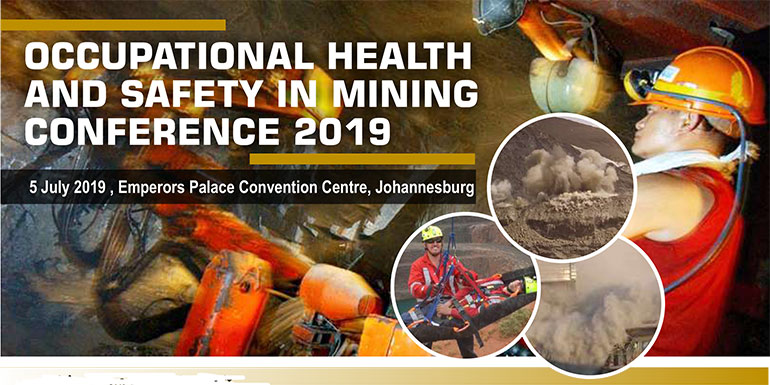
Apr
The mining industry in South Africa remains one of the most significant industries, playing an important role in the economic growth of the country, and creating employment. Interestingly, the industry is said to have made a significant contribution to GDP of $349,42bn in 2018. Nonetheless, mining is also a very dangerous industry, having been responsible for the deaths of thousands of miners throughout the years. The mining industry poses several health risks that include airborne pollutants such as silica dust and coal dust, noise, heat and vibration. Other significant health risks posed by mining include chemical risks, which are not related to underground air pollutants or gases, skin disorders, ergonomic stresses, ionizing radiation and, in the diamond sector on the west coast of the country, decompression illness associated with diving.
Although health risks can be avoided by implementing controls at source in the work environment, designing such controls for mining environments presents considerable challenges because dust and noise are generated by mining itself. Hence, occupational health and safety in mining is an area that needs to be explored and addressed, in order to come up with solutions that could help to eradicate hazards associated with the industry. With regulations of the Mine Health and Safety Act, and establishment of the Mine Health and Safety Inspectorate, a steady improvement was witnessed in the performance of the South African mining industry. Although coal, platinum and other mineral mines showed satisfactory performance, the injury fatality rates remained high in the case of underground gold mines, which called for an improvement in the prevention of occupational hazards. Despite an 88% improvement in fatality rates between 1993 and now, the mining industry still faces serious safety problems.
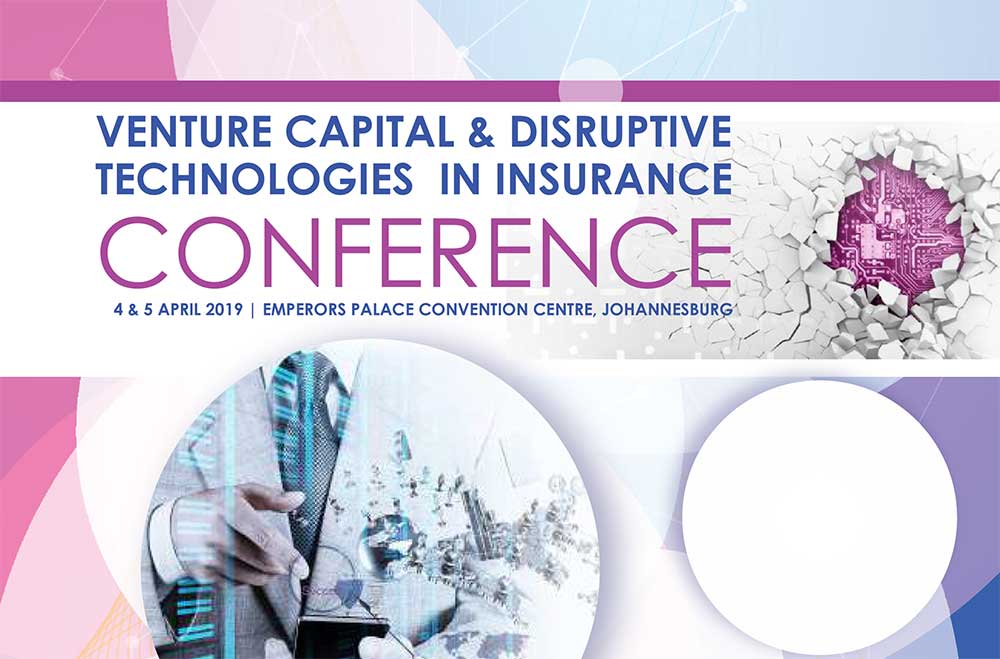
Feb
The Venture Capital and Disruptive Technologies in Insurance Conference returns for its second annual show at the Emperors Palace Convention Centre in Johannesburg, and this time, focus will be on the impact of disruptive start-up technology on the global insurance economy. The proliferation of various disruptive technologies on the world stage – within and without the insurance industry – has impacted the way in which insurers do their work. For instance, telematics technology in the transport industry, and wearable health devices and apps have improved road safety and health; which in turn has lowered claims and money spent on insurance premiums.
In this vein, the conference will look at how the technology boom will affect the world economy; as well as how bankable these technologies are for venture capitalists. As venture capital strategies and structures continue to evolve (through the advent of numerous seed funds, crowdfunding, secondary markets), the conference will seek to explore what leading capitalists expect when considering to invest in disruptive technologies. For instance; what differentiates one technology from the pack (could be industry-focus, geography, governance philosophy, partnership structure)? What looming regulatory or legal considerations are on the horizon?
The two-day event will be held on 4 & 5 April 2019 with a mission to unbundle the world of disruptive technologies to insurance companies and showcase how its growth will affect the insurance industry, as well as connect them with partners, investors, and other organizations to accelerate business growth. It will bring together some of the region’s best and brightest business minds to network, share business best practices, learn from the success of others and hear about some of the industries and technologies that are driving investment and innovation, especially in the insurance industry.
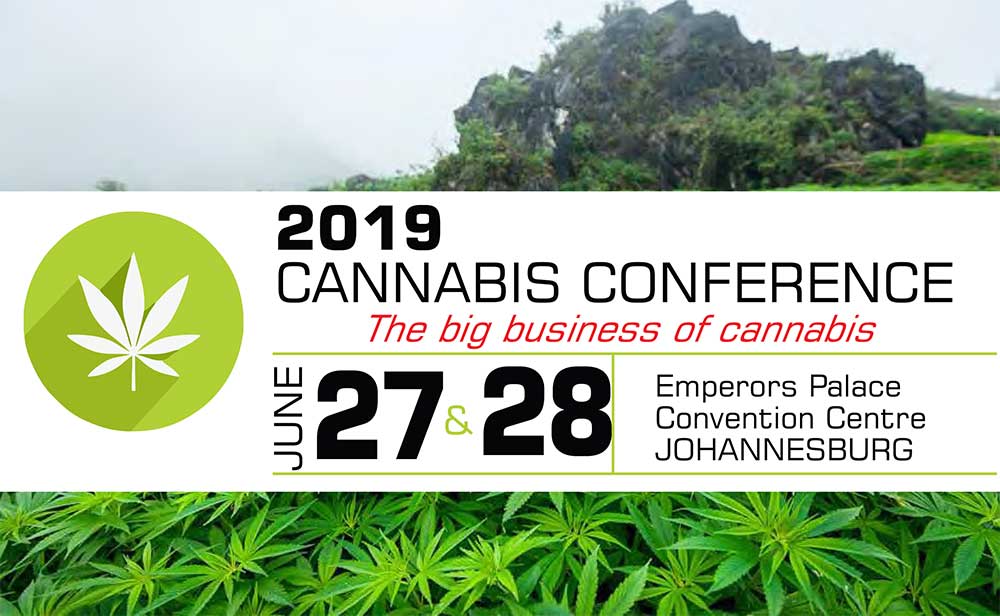
Feb
Cannabis Conference 2019
For decades, the growth and use of cannabis (also known as marijuana, weed, pot, dagga) for either recreational and/or medicinal purposes remained prohibited in almost every part of the world. Despite its illegality, marijuana use has been fairly common as it remained one of the most popular illegal drugs used in the world. Only most recently have some countries (Canada, Switzerland, Peru, Portugal, Italy etc.) decriminalised cannabis use, with others restricting its use for medicinal purposes only (Netherlands, New Zealand, Poland, Greece etc.). Most African countries have remained adamant to decriminalise the use of cannabis, except for Lesotho and Zimbabwe which recently legalised growth of marijuana for medicinal use. It was only last year on the 18th of September when the South African constitutional court legalised adult use of cannabis in private and growing enough for personal consumption.
Many celebrated this long awaited court’s decision such that a competition titled “Bushmastery” was launched from January to May2019, offering R1000 cash to anyone who can grow the biggest cannabis plant in the country. One could argue that this may be a strategy to encourage cannabis growers to venture into the burgeoning global cannabis industry. South Africa is amongst the very first few African countries to legalise marijuana use even though its usage is limited to the private sphere. What are the implications of this legalisation of marijuana for the country?
The cannabis plant is known to possess significant medicinal properties and health benefits, therefore, this is another interesting avenue to be explored at this upcoming conference. But then, although private personal consumption of cannabis was legalised, smoking it in public and trading the plant (buying and selling) remains illegal. Yet commercialisation of the crop could actually help to boost the country’s economy considering the booming global cannabis market. The American cannabis analytics company New Frontier Data suggested that legal cannabis could generate almost $132 billion in federal tax revenue by 2025 in the United States (Washington Post). 80 000 new jobs were created in the American state of California alone due to cannabis sales. So what can South Africa learn from this? According to analytical strategy development professional Vladislav Lakcevic in his MBA thesis, legalising cannabis in South Africa will likely result in increased tax revenue coupled with decreased government expenditure on law enforcement. Interestingly, despite actively enforced prohibition, South Africa is said to be a major producer and global supplier of cannabis (United Nations office on drugs). Would it be possible to legalise the trading of cannabis and then come up with an authentic framework to regulate the industry which could generate billions for the country?
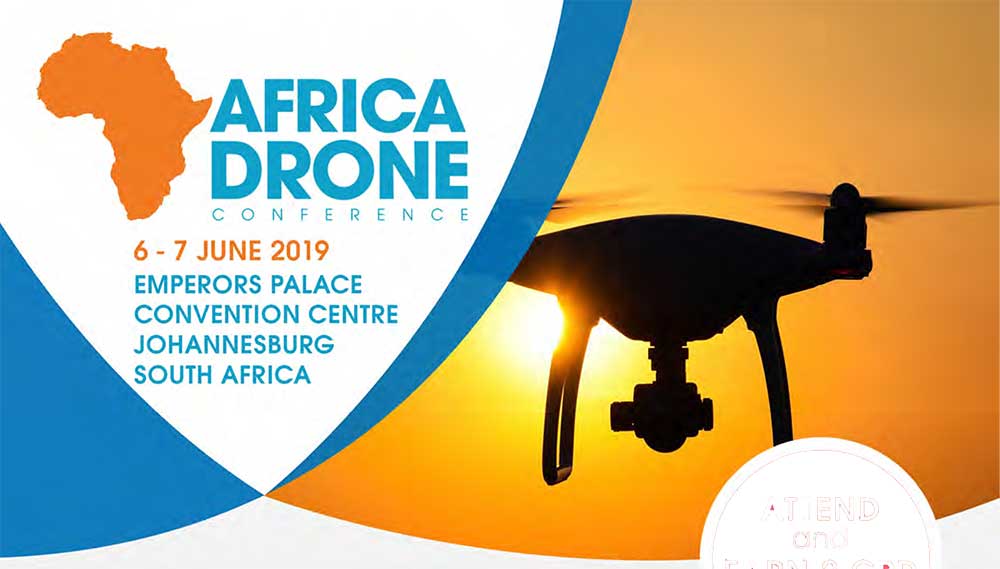
Feb
Africa Drone Conference
The best drones show in the country is back for the fourth year around. The previous three conferences since the inaugural November 2016 conference have been getting bigger and better. This year is no doubt going to be the year for the drones in South Africa and this is a conference that you cannot afford to miss.
The issue of regulations and drones’ certification and use is getting complicated with each year as technology continues to take the centre stage the world over. In South Africa, prospective users of this technology are getting frustrated of having to wait for years to get their licences. Thus, the evolving regulatory environment in the country has no doubt affected the adoption of commercial drones in the country.
However, on a positive note, drones are proving to be an indispensable technology as they are attesting their worth in the very different sectors. In this disruptive age, drones are proving to be the technology to adopt. Within the mining industry, the drones have facilitated the collection, and subsequent, processing, of more data than in the past, and this is pushing innovation mine-wide as data management processes are enhanced to ensure that other functional areas also benefit from the technology. Above all, the drones are boosting safety in the mines. In some mines the drones are being used for engineering inspections for equipment’s that cannot be easily accessed which dramatically eliminates safety risk.
On another hand, drones are being used to monitor infrastructural projects across the various provinces in the country. Thus, the conference will also address the advantages that municipalities in the country will have by adopting the use of drone. As such, the conference will also touch on different topics in the below sectors and presenters will speak on how the drones are changing the playing ground in the various sectors.
